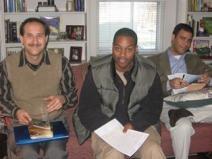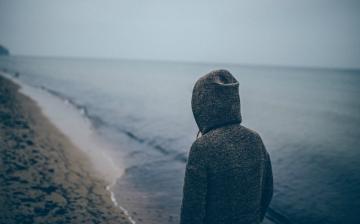Location
There are many ways in which your faith, your belief in Baha’u’llah and His teachings, can be tested. In its most outwardly violent form, some of us are publicly persecuted, discriminated against, or pressured to recant. Some of us are tested by calamities and intense physical suffering, like the loss of a loved one, or the destruction of everything you own. For some, other people — including other Baha’is — are a test of faith. Who hasn’t experienced difficulties with someone who just “rubs you the wrong way” or whose understanding of a teaching stands in sharp contrast to your own? And we can all be a test to ourselves. I was once asked, “What do you do when there is an aspect of your religion that troubles you? What do you do then?” I mumbled through an answer but studying excerpts from the 19 April 2013 message from the Universal House of Justice has helped me think through my answer to this question more profoundly.
The letter is in response to an individual who wrote that the Baha’i law of chastity is too difficult for Western believers to follow and they expressed a concern over the widening gulf between the principles of the Faith and the accepted norms of the wider society. How could this gulf possibly be crossed when it’s widening every day by almost everyone around us? While chastity is the subject of the letter, I found it incredibly useful as so many of my tests have been in trying to bridge that gulf between the laws I strive to obey, or the teachings I strive to understand, and world around me. Whether your faith is tested in regards to the sacred role of sexuality within a marriage between a man and a woman, abstinence from alcohol and drugs, obeying the laws of daily prayer and meditation, struggling to fast in a meaningful manner, or abstaining from backbiting — or any other Baha’i law — I think this letter provides an excellent map for navigating the murky waters of doubt.
The letter from the Universal House of Justice beautifully explains the context of this struggle. The letter addresses the fact that the Baha’i Faith has redefined what religion and religious laws are. The Universal House of Justice explains:
We live in an age when the role of religion in shaping human thought and in guiding individual and collective conduct is increasingly discounted. In societies that have bowed to the dictates of materialism, organized religion is seeing the sphere of its influence contract, becoming confined mostly to the realm of personal experience. Not infrequently the laws of religion are regarded as arbitrary rules blindly obeyed by those incapable of independent thought or as a prudish and outdated code of conduct hypocritically imposed upon others by advocates who, themselves, fail to live up to its demands. Morality is being redefined in such societies, and materialistic assumptions, values, and practices pertaining to the nature of humankind and its economic and social life are taking on the status of unassailable truth.
Once you are aware of your context, it is easier to think outside of it and better appreciate the teachings of the Faith. When the House of Justice describes how religious laws are perceived, it helps me understand how Baha’i religious laws defy that context and are something completely different.
The Universal House of Justice also describes the struggle of trying to bridge the gap between the teachings and the disintegrating society all around us. They write:
Throughout the world, in diverse cultures, Baha’is encounter values and practices that stand in sharp contrast to the teachings of the Faith. Some are embedded in social structures, for instance, racial prejudice and gender discrimination, economic exploitation and political corruption. Others pertain to personal conduct, especially with respect to the use of alcohol and drugs, to sexual behaviour, and to self-indulgence in general. If Baha’is simply surrender to the mores of society, how will conditions change?
I was moved by their acknowledgement of how intense this struggle is. The message goes on to say:
Young Baha’is especially need to take care, lest they imagine they can live according to the norms of contemporary society while adhering to Baha’i ideals at some minimum level to assuage their conscience or to satisfy the community, for they will soon find themselves consumed in a struggle to obey even the most basic of the Faith’s moral teachings and powerless to take up the challenges of their generation. “Wings that are besmirched with mire can never soar,” Baha’u’llah warns. The inner joy that every individual seeks, unlike a passing emotion, is not contingent on outside influences; it is a condition, born of certitude and conscious knowledge, fostered by a pure heart, which is able to distinguish between that which has permanence and that which is superficial.
I think when I answered my friend, I spoke about my certitude in the truth of the Faith and perhaps I gave a false impression of having blind faith, or that my certainty allows me to gloss over those teachings or laws that puzzle or challenge me. I should have also mentioned “conscious knowledge”. I can’t tell myself that although there are some aspects of the Faith that I can understand less than others, that I accept it all blindly – I need to meditate and study those aspects of the Faith that I have the hardest time upholding and understanding. I need to examine the Writings of the Bab, Baha’u’llah, Abdu’l-Baha, Shoghi Effendi and see what the House of Justice has to say on those subjects — perhaps someone with an identical struggle has written to them for guidance.
The letter goes on to say:
The qualities and habits of thought and action that characterize Baha’i life are developed through daily exertion. “Bring thyself to account each day”, writes Baha’u’llah. “Let each morn be better than its eve”, He advises, “and each morrow richer than its yesterday.” The friends should not lose heart in their personal struggles to attain to the Divine standard, nor be seduced by the argument that, since mistakes will inevitably be made and perfection is impossible, it is futile to exert an effort. They are to steer clear of the pitfalls of hypocrisy, on the one hand—that is, saying one thing yet doing another—and heedlessness, on the other—that is, disregard for the laws, ignoring or explaining away the need to follow them. So too is paralysis engendered by guilt to be avoided; indeed, preoccupation with a particular moral failing can, at times, make it more challenging for it to be overcome.
It is only natural that our faith is tested and that there are some laws or aspects that may prove more challenging than others. The House of Justice beautifully reminds us though, that we are not struggling alone – even though obedience to the laws is a matter of our personal relationship with our Beloved:
What the friends need to remember in this respect is that, in their efforts to achieve personal growth and to uphold Baha’i ideals, they are not isolated individuals, withstanding alone the onslaught of the forces of moral decay operating in society. They are members of a purposeful community, global in scope, pursuing a bold spiritual mission—working to establish a pattern of activity and administrative structures suited to a humanity entering its age of maturity.
I am grateful to the anonymous individual who wrote to the Universal House of Justice as the excerpts of their reply are invaluable, encouraging and inspiring and are words I will revisit and restudy.
- See more at: http://bahaiblog.net/site/2015/07/what-happens-when-your-faith-is-tested...

